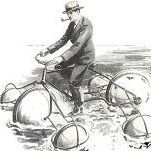All Activity
- Past hour
-
I think Peterboat has a point. A few years ago I didn't have to think twice about trundling off for eight weeks. Now it's down to five in the summer, because I can't afford the diesel and gas, and ditto in the rest of the year because of the price of coal . The fixed costs of licence and mooring have almost doubled (probably more in the case of marina dwellers) and so have running costs. My blacking cost has risen by over 100%, safety certificate is now a ridiculous price (and some idiots, probably mostly examiners, now want it annually). You can understand why some continuous cruisers don't move as often as they used to and why leisure boaters go for shorter trips and shorter days. A lot of the attraction for short holiday boaters was pub hopping, too, and stacks of them are shut and, again, prices are through the roof.
-
Of course, for those of us who have owned their boats for a longer time, the cost of taking the boat out has increased significantly. For us, it used to be almost pennies per day now it is £'s per hour. My boat would sell for the same number of £'s that it cost. (Yes, of course, inflation will have had an effect but I don't worry about depreciation.)
-
This post cannot be displayed because it is in a forum which requires at least 10 posts to view.
-
I tapped holes in the roof and bolted my panels down on the boat using security Torx with a dab of sealant on each bolt.. No reason to use Sikaflex at all unless you have a fibreglass or wooden roof.😱
-
Yes but even you probably stay in the odd place for a couple of days or more and some of us need a simple steer as to when the batteries need charging before they are damaged. I know you can run the engine every day but this may be not very pleasant for fellow moorees . It’s much more considerate if you can wait until when you move off again
-
That's fair enough. We're not doing that here though, and experience on narrowboat roof mounted solar panels through several British winters seems a pretty fair test for the OP's similar application.
-
Given that the vast majority of the cost of a boat are the fixed costs of owning it and that moving around costs little in comparison, that seems unlikely -- if people can't afford to use them they can't afford to own them either and would sell up. Or if that's a thinly-disguised dig at CRT's increased license fees, these are still very low and are only a small fraction of the annual cost of owning/running a boat -- probably less than 20% for someone CCing on an old (not-depreciating-much) boat, less than 10% for someone with a newer boat on a home mooring, probably less than 5% for someone with a new (or relatively new) boat moored in a marina where depreciation is the biggest (disguised) expense, just like most cars.
-
Well, that's that sorted then! Thank you. For those who are not aware, this is what it says on CRTs page: "you will need to book your passage online and return to your home navigation authority within the ten days. You can revisit the other authority’s water again after a 28-day period." The 7 days and 3 more to return only comes to light when you sign in and complete their booking form and find there's a tick box at the bottom offering a return extension. Why don't they just say what @TheBiscuits said - it makes so much more sense. That's it, no more research - henceforth its straight to my oracle @TheBiscuits for all my north west advice!
-
My system is simpler. If it's daylight, it's time to cruise. The batteries sort themselves
-

A broad view of canal boat licence fees (The other side)
IanD replied to Alan de Enfield's topic in General Boating
As well as the real problems (services, planning permission...) in expanding the use of the canals for residential purposes, the elephant in the room is that this is a tiny drop in the very large bucket which is the shortage of truly affordable housing in the UK -- a need which used to be met by council housing at well-below-market rates as a social need, but not any more... 😞 Filling up the canals -- at least, near towns and cities and villages which is where most of the CMers (yes I'm going to use that term, I think everyone knows the meaning) want to moor -- with end-to-end boats would meet rather less than 1% of the UKs need for cheap housing, while making them much less attractive for boaters -- hire and owned -- who want to move around the canals, and who bring more desperately-needed money to the canals than the CMers. So it doesn't solve the housing problem and would have a big negative effect on the canals, which doesn't look like a good deal to me, or I suspect most others who love the canals. I'm not saying that CARTs current license/mooring policies couldn't be improved, but thinking that allowing mass uncontrolled mooring would magically provide lots of homes for poorer people seems deluded -- the solution to this problem is for the government (directly or indirectly) to restart building large numbers of truly affordable homes which are not then sold off to tenants or private landlords. But this is unlikely to happen with the current makeup of the government because it might lower house prices and depress rents, which is exactly what many Tory MPs (who are private landlords) don't want to happen -- look at their caving-in on leasehold and rent reforms... 😞 - Today
-
I disagree, it's always worked for me. White spirit removes any grease or oil and doesn't leave any significant residue itself - at least none that would present any issue with most single part paints or modified polymer sealants from sticking. I wasn't talking about pouring the stuff on. Agreed, I wouldn't use white spirit to wipe over before applying epoxy, but I have used the correct thinners for the epoxy. Likewise for single part paints based on white spirit thinners I've used white spirit as a wipe. Doesn't acetone leave a residue too?
-
This post cannot be displayed because it is in a forum which requires at least 10 posts to view.
-
This post cannot be displayed because it is in a forum which requires at least 10 posts to view.
-

Good new prog C4 @4pm, weekdays, about Living On Canal and waterways
blackrose replied to LEO's topic in General Boating
No as he already said, he's a watch clocker. -

Good new prog C4 @4pm, weekdays, about Living On Canal and waterways
IanD replied to LEO's topic in General Boating
Why didn't you use your trombone to just knock it off the wall without getting out of bed? Oh dear, I've just made the assumption you sleep with your trombone... 😉 -

Good new prog C4 @4pm, weekdays, about Living On Canal and waterways
Mike Todd replied to LEO's topic in General Boating
You are obviously not a clock watcher. -
Ambiguous. Do you mean "use it for the final wipe" or do you mean "don't use it at all?" 😁
-
This post cannot be displayed because it is in a forum which requires at least 10 posts to view.
-
Depends if you want it to stay fixed or not. I was bonding a solar panel to the top of the caravan so 60mph winds are common. Didn't want it lifting off and hitting the car behind 😱
-
Looking at some of the cast, their new boats cost well in excess of £200k, the boys that had an Oakhams boat and apparently have had nothing but trouble with it. Also a couple that say they sold everything to live on the boat and continuous cruise, but put their boat in a marina Nov-May and go home and have holidays abroad, with no photos of boating on their Instagram during this time. It will be interesting to see how many actually tell the facts/truth on National TV.
-

A broad view of canal boat licence fees (The other side)
Mike Todd replied to Alan de Enfield's topic in General Boating
What I was emphasising was that one difference between boaters with and without a home mooring is that the latter have to 'satisfy the `Board regarding their cruising intentions (bona fide is, in part, an intention as much as a reality). If they fail then the Board have the option of not granting a licence but they have to do so 'reasonably' ie not in an arbitrary or discriminatory manner. In fact, they are currently starting to do this a bit more vigorously, esp on K&A, with the use of six month licences as a graduated approach. One of the benefits is that it puts back the point at which the only option is to take court action to remove the boat which is a very lengthy and expensive option. At the moment, starting from a point where boaters staying a very long time in 'one place' lead to growing discontent between groups with differing expectations from the canals. Whilst the current interpretation of what will 'satisfy the Board' is quite limited (the oft misunderstood 20 mile rule) it does have the impact of getting boaters used to moving and not having a piece of towpath as their long term personal 'loft'. This has proved to be a process, couples with the 'reasonable adaptation' agreements for those covered by specific discrimination laws, by and large to be an humane one and has garnered more support than antagonism (both are inevitable!) I suspect we can anticipate that over time this experience will be rolled out more widely and with gradually better definitions. As far as I can see, those who seek to challenge the navigation authorities in court - generally ending up losing - only help the NAs by establishing case law which can then be cited in later interactions. (See recent cases on Thames) To expand the use of the canals for deliberate residential purposes is more than simply allowing boats to stay in one place for long periods. The greater problem is with the provision of services which are rarely at a level that can cope with larger numbers. This has become a growing issue in London, for example, where a surprisingly small number of taps have to be shared by hundreds of dwellers. Sewage and rubbish are also very overloaded. The latter has become a larger problem as the collection companies become ever more restrictive on what places they will collect from. hence the closure of a number of traditional sites. (see Stone for example) Car parking can also be a sore point with local residents (who fail to recognise that the road outsole their house is not their private parking space!) These are, typically, matters that loom large in planning decisions. -
The agreement doesn't give ten days. It gives seven days plus three days for exactly what you want to do! You book your outbound days first, then add your return days to the same booking. If you know your travel dates in advance you can book them all at once Add a bit: For clarity, you need to select "return" not "single" on the booking form. This gives you two calendars instead of one, and you put the first day of each trip as the date.
-
No one will notice if you don't hang about too long in one place. The Bridgewater licenced boats ignore the time restrictions on C&RT waters all the time.
-
BWM started following Which sikaflex variant
-
If the purpose is to remove a greasy or oily residue, then white spirit is the last thing to use!










